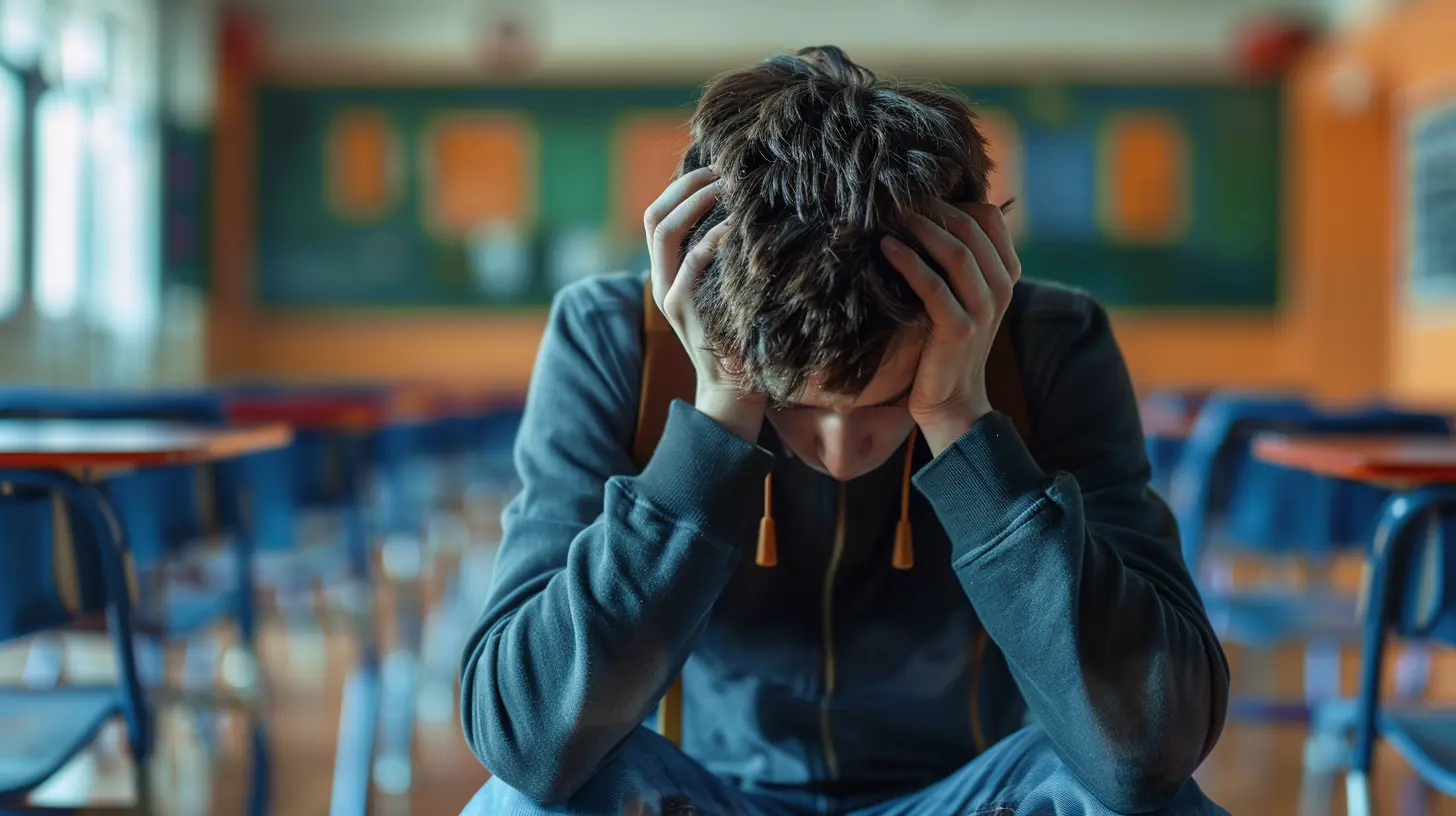How to Handle Mental Health Crises in Schools
16 May 2025
Mental health is just as important as physical health—yet in many schools, it's often overlooked. With increasing pressure from academics, social expectations, and personal struggles, students today face an unprecedented mental health crisis.
But what happens when a student reaches a breaking point? What should educators, administrators, and even peers do? Handling a mental health crisis in schools isn’t just a responsibility—it’s a necessity.
Let’s dive into the best strategies to identify, manage, and prevent mental health crises in schools effectively.

Understanding Mental Health Crises
Before we talk about solutions, it's important to understand what a mental health crisis actually looks like. A crisis isn’t just a bad day or feeling overwhelmed. It’s when a student is unable to cope, and their mental health deteriorates to the point that they may harm themselves or others.Some common signs of a crisis include:
- Sudden withdrawal from friends and activities
- Extreme mood swings
- Expressing thoughts of self-harm or suicide
- Panic attacks or severe anxiety
- Angry outbursts or aggressive behavior
- Substance abuse
- Inability to focus or complete tasks
Ignoring these signs can lead to tragic consequences. But with the right approach, we can intervene and support students before things spiral out of control. 
Immediate Steps to Take During a Mental Health Crisis
A mental health crisis needs immediate attention, just like a medical emergency. Here’s what schools should do in the moment:1. Stay Calm and Provide Immediate Support
Panic helps no one. If a student is experiencing a crisis, approach them calmly. Speak in a soothing, reassuring tone, and let them know they are not alone.2. Ensure Safety
If a student is in danger of harming themselves or others, remove potential risks (sharp objects, medications, etc.) from their surroundings. If necessary, escort them to a safe space where they can calm down without external pressures.3. Engage in Active Listening
Students in crisis may feel unheard or misunderstood. Instead of offering solutions right away, listen. A simple “I’m here for you” can go a long way. Reflect on what they’re saying and validate their emotions.4. Contact the Right Personnel
Schools should have designated crisis response teams consisting of counselors, psychologists, and trained teachers. If a student’s life is in imminent danger, call emergency services immediately.5. Avoid Punishment or Judgment
If a student is acting out due to a crisis, don’t resort to disciplinary action. Punishment can make the situation worse and discourage them from seeking help in the future.
Long-Term Strategies for Preventing Mental Health Crises
Prevention is always better than intervention. Schools can take proactive measures to reduce the likelihood of mental health crises among students.1. Implement Mental Health Education
Mental health should be part of the curriculum. Teaching students about emotions, stress management, and coping mechanisms equips them with tools to handle tough situations.2. Create a Supportive Environment
A culture of kindness, acceptance, and support can change everything. Encourage open conversations about mental health and let students know they can seek help without fear of judgment.3. Train Teachers and Staff
Teachers are on the front lines. They need proper training to recognize early warning signs and respond effectively. Mental health training sessions should be mandatory for all school staff.4. Establish School Counseling Programs
Every school should have professional counselors available for students. These professionals should be approachable and actively involved in student well-being beyond scheduled appointments.5. Encourage Peer Support Programs
Sometimes, students feel more comfortable talking to their peers than to adults. Establishing peer support groups or mentoring programs can provide a valuable support system.6. Promote Healthy Coping Mechanisms
Schools should encourage activities that help students manage stress, such as mindfulness, yoga, art therapy, and sports. These are great outlets for students to channel their emotions positively.7. Reduce Academic Pressure
While academic success is important, mental health should never take a backseat. Schools need to balance workloads and ensure students aren't pushed to the breaking point.
The Role of Parents in Supporting Students
Schools aren’t the only place where mental health matters—parents play a crucial role too. Open communication between schools and families can make all the difference.1. Keep Communication Open
Parents should regularly check in with their children, asking about their school life, friendships, and emotions in a non-judgmental way.2. Recognize Warning Signs Early
Parents should stay alert to changes in behavior, mood, and academic performance. If something seems off, don’t ignore it—dig deeper.3. Encourage Professional Help
Mental health professionals exist for a reason. If a child is struggling, therapy or counseling should be encouraged just like a visit to the doctor for a physical illness.Breaking the Stigma Around Mental Health
One of the biggest barriers to handling mental health crises in schools is the stigma attached to seeking help. Students often hesitate to speak up, fearing judgment or repercussions.Schools must actively work toward breaking this stigma by:
- Promoting mental health awareness campaigns
- Sharing real-life success stories of individuals who sought help and recovered
- Encouraging faculty, staff, and students to talk openly about mental health
It’s simple—mental health discussions should be as normal as talking about physical health problems.
What Happens After a Crisis?
Once a crisis has been managed, the work isn’t over. Schools need to have a follow-up plan to ensure students continue receiving the support they need.1. Provide Continued Counseling and Support
The recovery process doesn’t happen overnight. Schools should encourage ongoing therapy sessions and regular check-ins with counselors.2. Create a Personalized Support Plan
Every student is different. Develop a customized plan that includes academic adjustments, mental health resources, and peer support to help them reintegrate smoothly.3. Include Parents in the Recovery Process
Parents should be kept in the loop about their child’s progress and be given resources to support them at home.4. Assess and Improve Crisis Response Plans
Every crisis should be a learning opportunity. Schools should analyze how situations were handled and identify areas for improvement in their response strategies.Final Thoughts
Mental health crises in schools are real, and ignoring them isn’t an option. Schools must take immediate action to support struggling students while also focusing on long-term preventive measures.When students feel supported, safe, and heard, they can thrive—not just academically, but emotionally too. After all, education isn’t just about grades—it’s about shaping well-rounded individuals who are prepared to face life’s challenges.
Handling mental health crises in schools isn’t easy, but with the right approach, we can make a difference—one student at a time.
all images in this post were generated using AI tools
Category:
Mental Health In SchoolsAuthor:

Madeleine Newton
Discussion
rate this article
4 comments
Alana McInnes
This article sheds light on a crucial topic that often goes overlooked. Supporting students during mental health crises is vital for their well-being and academic success. Implementing proactive strategies and fostering an open environment can make a significant difference. Let's prioritize mental health in our schools and empower every student to thrive!
May 24, 2025 at 3:08 AM

Madeleine Newton
Thank you for your insightful comment! Prioritizing mental health and proactive support in schools is indeed essential for fostering student well-being and success.
Lindsey Weber
This article is a vital resource for educators and school staff. It emphasizes the importance of recognizing mental health crises promptly and provides practical strategies for intervention. Implementing these approaches can foster a supportive environment, ensuring students receive the help they need during challenging times.
May 22, 2025 at 2:49 AM

Madeleine Newton
Thank you for your insightful comment! I'm glad you found the article helpful in highlighting the importance of timely intervention and support for students' mental health.
Evren McClure
This article highlights the crucial need for proactive mental health support in schools. Addressing crises with compassion and resources can truly transform student experiences and outcomes.
May 20, 2025 at 2:15 PM

Madeleine Newton
Thank you for highlighting the importance of proactive support! Compassionate resources are indeed vital for transforming student well-being.
Nixie McGlynn
This article provides essential strategies for schools to effectively support students during mental health crises, emphasizing proactive measures, staff training, and fostering open communication. Great read!
May 17, 2025 at 12:02 PM

Madeleine Newton
Thank you for your feedback! I'm glad you found the strategies valuable. Supporting students during mental health crises is crucial.



